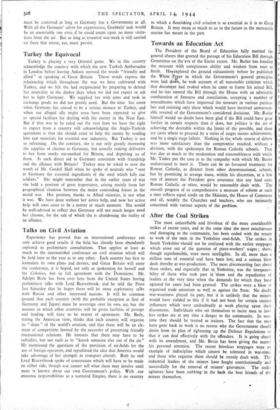Talks on Civil Aviation
Experience has proved that an international conference can only achieve good results if the field has already been abundantly explored in preliminary consultations. That applies at least as much to the internatiohal conference on civil aviation which will be held later in the year as to any other. Each country has first to formulate its own plans and desires, and Great Britain will enter the conference, it is hoped, not only as spokesman for herself and the Colonies, but in full agreement with the Dominions. Mr. Adolph Berle has been over here from the United States having preliminary talks with Lord Beaverbrook, and he told the Press last Saturday that he hopes there will be more exploratory talks with Russia and other interested nations. It will be common ground that each country (with the probable exception at first of Germany and japan) must be sovereign over its own air, but the manner in which other countries will be given facilities of passage and landing will have to be matter of agreement. Mr. Berle, stating the American view, thinks that each country will organise its "share" of the world's aviation, and that there will be an ele- ment of competiiion limited by the necessity of preserving friendly international relations. He foresees that there may have to be subsidies, but not such as to "knock someone else out of the air." He mentioned the questions of the provision of air-fields for the use of foreign operators, and repudiated the idea that America would take advantage of her strength in transport aircraft. Both he and Lord Beaverbrook spoke of concessions which will have to be made on either side, though one cannot tell what these may involve until more is known about our own Government's policy. With our immense responsibilities to a scattered Empire, there is no country to which a flourishing civil aviation is so essential as it is to Great Britain. It may mean as much to us in the future as the mercantile marine has meant in the past.


























 Previous page
Previous page